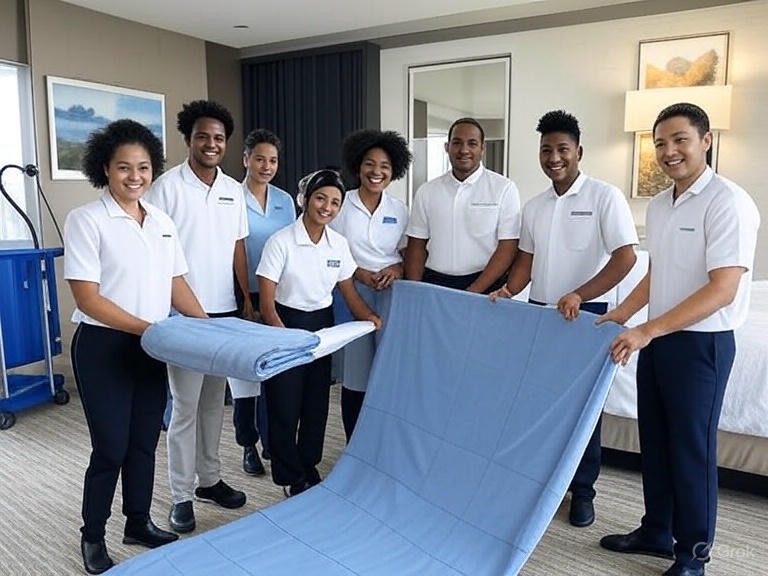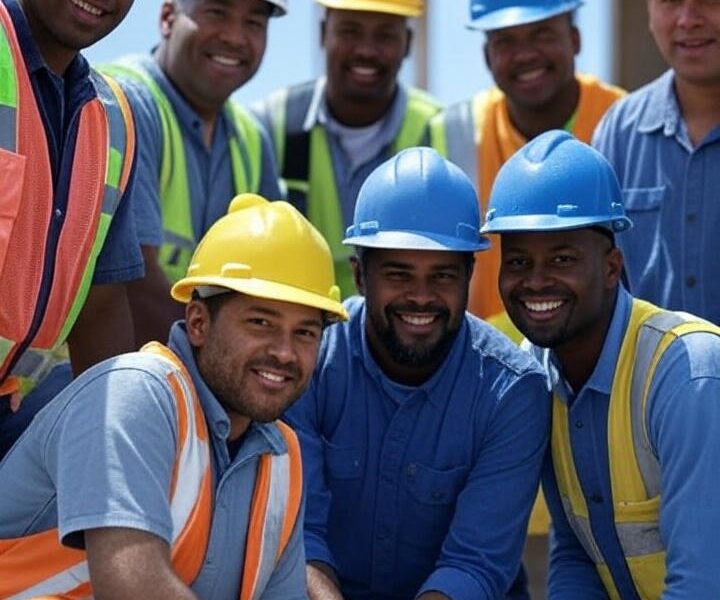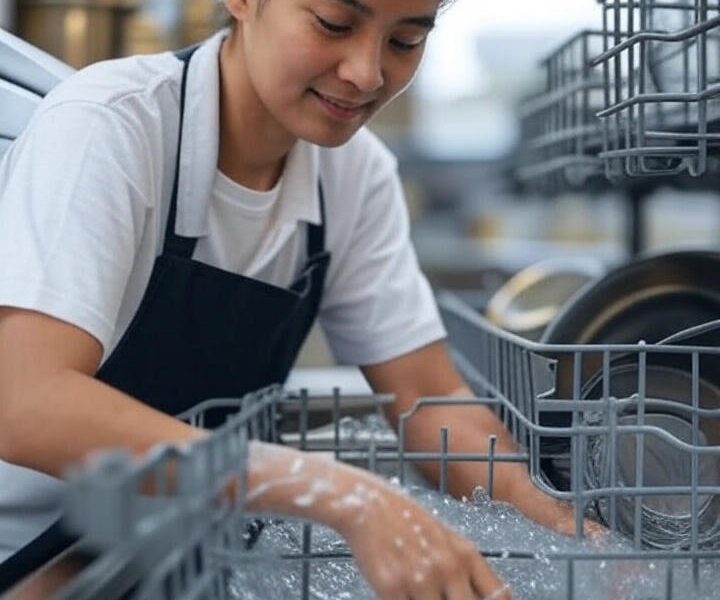The United States’ hospitality and healthcare sectors, integral to its $21 trillion economy, employ over 900,000 housekeepers, ensuring cleanliness and comfort in hotels, hospitals, and residential facilities.
The Bureau of Labor Statistics (BLS) projects 236,500 annual openings for maids and housekeeping cleaners through 2032, driven by high turnover and growing demand.
Foreign workers, particularly from Nigeria and other eligible countries, can seize these opportunities through visa sponsorship programs, primarily the H-2B temporary non-agricultural visa.
Housekeeping jobs offer wages of $28,000-$40,000 annually, opportunities in states like Florida, California, and Texas, and benefits like free housing and transportation.
This guide explores housekeeping jobs in the USA with visa sponsorship in 2025, detailing the job market, visa processes, requirements, application strategies, benefits, responsibilities, and challenges, tailored for Nigerian workers.
Drawing on data from the BLS, U.S. Department of Labor (DOL), U.S. Citizenship and Immigration Services (USCIS), and industry sources, it provides a comprehensive roadmap to thrive in America’s cleaning industry.
Housekeepers maintain hygiene in settings like hotels, hospitals, and homes, performing tasks such as vacuuming, bed-making, and sanitizing surfaces. Employers like Marriott International, ABM Industries, and Merry Maids are actively sponsoring foreign workers to address a 35% vacancy rate reported by the International Sanitary Supply Association (ISSA) in 2024.
The H-2B visa, with a 2025 cap of 66,000 plus a supplemental 64,716 visas, is the primary pathway, enabling workers from Nigeria to secure roles in high-demand regions.
This article equips Nigerian workers with the tools to navigate the job market, obtain sponsorship, and succeed, whether cleaning guest rooms in Miami or sanitizing hospital wards in Houston.
The Housekeeping Job Market in the USA 2025
Overview and Trends
The U.S. cleaning industry, valued at $90 billion, supports hospitality, healthcare, and residential sectors, employing 900,000 maids and housekeepers (BLS, 2024). The sector’s 4% projected growth through 2032 is driven by:
- Hospitality Expansion: 68 million international tourists in 2024 fueled hotel demand, per the U.S. Travel Association.
- Healthcare Needs: $1 trillion in hospital infrastructure investments requires stringent hygiene standards.
- Post-COVID Standards: Enhanced sanitation protocols in public spaces, with 80% of facilities increasing cleaning budgets (ISSA, 2024).
- Residential Growth: Affluent households drive demand for home cleaning services.
- Labor Shortages: 35% turnover rate and 550,000 unfilled cleaning jobs in 2024 (ISSA).
High-Demand Roles and Locations
Housekeeping roles include:
- Hotel Housekeepers: Clean guest rooms, change linens, and sanitize bathrooms (e.g., Marriott, Hilton).
- Janitors/Custodians: Maintain offices, schools, and hospitals, handling tasks like floor care and trash removal.
- Residential Cleaners: Service private homes, focusing on dusting and laundry (e.g., Merry Maids).
- Specialized Cleaners: Perform biohazard or post-construction cleaning, earning higher wages.
Top states for visa-sponsored housekeeping jobs:
- Florida: 18,200 H-2B certifications in 2023, with roles in Miami, Orlando, and Tampa.
- California: 15,000 certifications, centered in Los Angeles, San Francisco, and San Diego.
- Texas: 12,500 certifications, with demand in Houston, Austin, and Dallas.
- Nevada: High wages ($30,000-$42,000) in Las Vegas.
- New York: Roles in New York City and Long Island.
Wages and Employers
- Median Wage: $31,920/year ($15.35/hour) for maids and housekeepers (BLS, 2024).
- Entry-Level: $28,000-$32,000; experienced or specialized cleaners earn $35,000-$45,000.
- Overtime: 1.5x pay adds $2,000-$5,000 annually in busy settings.
- Major Employers:
- Marriott International: Sponsors H-2B housekeepers for hotels and resorts.
- ABM Industries: Janitorial services for offices and schools, offering visa support.
- Merry Maids: Residential cleaning with H-2B sponsorship.
- Sodexo: Facility services in hospitals and universities.
- Alliance Abroad: Recruitment agency placing H-2B cleaners.
- Seasonal Employers: Walt Disney World and Caesars Entertainment for resort roles.
Visa Options for Housekeeping Jobs
Foreign housekeepers primarily rely on the H-2B visa for temporary roles, as the EB-3 visa is less common for low-skill positions. Below is an overview based on USCIS and DOL guidelines.
H-2B Visa (Temporary Non-Agricultural Worker)
- Purpose: For temporary, non-agricultural roles when U.S. workers are unavailable, such as seasonal or peak-load housekeeping (e.g., summer hotel staffing).
- Cap: 66,000 visas annually, with a 64,716 supplemental allocation in FY 2025, including 20,000 for nationals of El Salvador, Guatemala, Honduras, Haiti, Colombia, Ecuador, and Costa Rica, exempt from returning worker requirements. Nigeria is eligible for H-2B visas, with 2,500 Nigerian workers certified in 2024 (DOL).
- Duration: Up to 9 months, extendable to 3 years, with a 3-month return home required.
- Eligibility: Job offer from a DOL-approved employer, country eligibility, and intent to return.
- Process:
- Employer secures Prevailing Wage Determination (PWD) to ensure wages meet local standards (e.g., $16/hour in Florida).
- Employer conducts a labor market test and files for Temporary Labor Certification (Form ETA-9142B).
- Employer submits Form I-129 ($1,500 fee, employer-paid).
- Worker applies for an H-2B visa at a U.S. embassy/consulate.
- Processing Time: 3-6 months (2-4 weeks for visa, 60-90 days for I-129).
- Benefits: Employer reimburses $205 visa fee, travel costs ($500-$2,000), and subsistence. FY 2025 portability allows employer switches.
- Limitations: Temporary; no direct path to permanent residency.
EB-3 Visa (Employment-Based Permanent)
- Purpose: For “other workers” with a job offer, leading to permanent residency, though rare for housekeeping due to low skill requirements.
- Eligibility: Job offer, high school diploma or equivalent, and 1-2 years of experience.
- Process:
- Employer obtains labor certification (ETA-9089A) via PERM test.
- Employer files Form I-140 ($700 fee).
- Worker files Form I-485 or consular processing for a green card.
- Processing Time: 12-36 months, with backlogs for countries like Nigeria.
- Benefits: Permanent residency and family reunification.
- Limitations: Few employers (e.g., large hotel chains) sponsor EB-3 for housekeepers due to cost.
Other Considerations
- J-1 Visa: Used for cultural exchange, not suitable for housekeeping.
- H-1B Visa: Inapplicable, as housekeeping lacks degree requirements.
- Job Seeker Visa: Not available; a job offer is mandatory.
The H-2B is the primary pathway, with 85% of visa-sponsored housekeeping jobs using this visa, per DOL data.
The Job Search and Visa Application Process
Securing a visa-sponsored housekeeping job involves a structured approach to job hunting, application preparation, and visa processing. Below is a detailed roadmap for Nigerian workers in 2025.
Step 1: Research and Find Jobs
- Job Portals:
- Indeed: 200 visa-sponsored housekeeping jobs, filterable by “H-2B visa.”
- SimplyHired: 120 jobs, including roles at Marriott and ABM Industries.
- Hcareers: 70 jobs, focusing on hospitality cleaning.
- CoolWorks: Lists seasonal roles at resorts and theme parks.
- SeasonalJobs.dol.gov: 150+ H-2B housekeeping jobs.
- Recruitment Agencies:
- Alliance Abroad: Places H-2B housekeepers in hotels and resorts, specializing in Nigerian workers.
- Labor Finders: Connects workers with janitorial employers.
- H2B Programs: Focuses on visa-sponsored roles across hospitality.
- Global Employment Solutions: Recruits for hotels and cleaning services.
- Fees ($500-$2,000) are typically employer-paid, per DOL regulations.
- Employer Websites: Marriott, ABM Industries, Merry Maids, and Sodexo post sponsored roles on their career pages.
- Networking: Join LinkedIn groups like “Hospitality Jobs USA” or expat forums on Reddit (r/immigration). Virtual job fairs by Hcareers or ISSA connect Nigerian workers with employers. Connect with Nigerian diaspora groups on platforms like Nigerians in Diaspora Organisation for referrals.
Step 2: Prepare Application Materials
- Resume: Highlight cleaning experience, physical stamina, and attention to detail. Include visa eligibility (e.g., “Eligible for H-2B sponsorship from Nigeria”). Keep it concise (1 page) and professional.
- Cover Letter: Tailor to the employer, emphasizing reliability (e.g., “As a dedicated housekeeper from Nigeria with 1 year of experience, I am eager to contribute to your team under H-2B sponsorship”). Limit to half a page.
- Documents: Provide work references, certificates (e.g., prior cleaning jobs), and translated documents ($50-$100/document). Nigerian police certificates and health records should be prepared in advance.
Step 3: Apply and Interview
- Applications: Submit through job portals or employer websites. Follow up within 7-10 days via email or phone to show enthusiasm.
- Interviews: Expect questions on work ethic (e.g., “How do you ensure a room is cleaned efficiently?”) and visa knowledge (e.g., “Are you familiar with H-2B requirements?”). Practice basic English responses, leveraging Nigeria’s English proficiency. For remote interviews, ensure a stable internet connection and quiet setting. For in-person interviews at U.S. embassies or job fairs, wear clean, professional attire (e.g., polo shirt, trousers). Bring copies of your resume, references, and passport.
- Job Offer: The employer provides a contract, specifying wages, hours, and housing, initiating the visa process.
Step 4: Apply for H-2B Visa
- Employer Steps:
- Secure PWD to confirm wages (e.g., $16/hour in Texas, 2-4 weeks).
- Conduct labor market test and file for Temporary Labor Certification (Form ETA-9142B, 30-60 days).
- Submit Form I-129 to USCIS ($1,500 fee, employer-paid, 60-90 days).
- Worker Steps:
- Schedule an appointment at the U.S. Embassy in Abuja or Lagos via USCIS.
- Submit Form DS-160 online, paying $205 visa fee and $185-$205 processing costs (employer-reimbursed).
- Provide:
- Valid Nigerian passport and photos
- Form I-797 (I-129 approval notice)
- Job offer letter
- Proof of ties to Nigeria (e.g., family documents, property deeds)
- Nigerian police certificate
- Health exam results (TB test, vaccinations)
- Attend a consular interview (5-10 minutes) at the U.S. Embassy, addressing job details and intent to return to Nigeria. Processing takes 2-4 weeks.
- Entry: Enter the U.S. within 10 days of the job start date, typically via flights to major hubs like Miami or Houston ($500-$1,500, reimbursed).
Step 5: Start Employment
- Employers provide orientation, including OSHA-compliant training (e.g., chemical safety, equipment use) and housing (e.g., shared apartments or dorms). Begin work within 10 days, adhering to contract terms.
Engaging an immigration attorney ($1,500-$3,500) or agency like Alliance Abroad can streamline the process, though self-application is feasible with preparation. Nigerian workers should contact the U.S. Embassy in Lagos for visa appointment guidance (U.S. Embassy Nigeria).
Benefits and Responsibilities
Visa-sponsored housekeeping jobs offer significant benefits, balanced by responsibilities, making them appealing for Nigerian workers.
Benefits
- Wages: $28,000-$45,000/year, with overtime adding $2,000-$5,000, competitive for entry-level roles.
- Visa Sponsorship: H-2B ensures legal work for up to 9 months, extendable to 3 years, with no worker-paid fees.
- Free Housing: Employer-provided accommodations (e.g., shared apartments, dorms) meeting OSHA standards, saving $500-$1,000/month.
- Transportation: Reimbursed travel to/from Nigeria ($500-$2,000) and worksite commuting (e.g., shuttle services).
- Benefits: Health insurance ($100-$200/month, employer-shared for some), uniforms, and occasionally meals (e.g., hotel roles).
- Career Growth: Experience leads to roles like lead housekeeper ($40,000-$50,000) or supervisor. Training (e.g., ISSA certifications, $100-$300) enhances prospects.
- U.S. Experience: Improves English fluency and employability, with 65% of H-2B workers reporting career benefits (DOL, 2024).
- Cultural Exposure: Work in vibrant cities like Miami or scenic resorts like Orlando, with access to U.S. culture through festivals, museums, and community events.
Responsibilities
- Visa Compliance: Work only for the sponsoring employer; overstaying risks a 3-10-year re-entry ban, enforceable by ICE.
- Performance: Meet sanitation standards (e.g., OSHA, CDC guidelines) and maintain efficiency to ensure guestsatisfaction and workplace efficiency. Employers like Marriott and ABM Industries often provide training to ensure compliance with these standards, which is particularly important in hospitality and healthcare settings where hygiene is critical. Maintaining consistent performance is key to securing contract extensions or future job opportunities.
- Cultural Adaptation: Nigerian workers must adapt to U.S. workplace norms, such as punctuality, direct communication, and adherence to strict cleaning protocols. Engaging with coworkers and learning about U.S. hospitality culture can enhance integration.
- Compliance with Regulations: Housekeepers must comply with federal and state labor laws, including minimum wage requirements and overtime rules. Any workplace violations, such as unpaid wages or unsafe conditions, should be reported to the DOL’s Wage and Hour Division to ensure worker protections are upheld.
This framework ensures that Nigerian workers can maximize the financial and professional rewards of housekeeping jobs while fulfilling their obligations to maintain legal status and workplace standards.
Challenges and Strategies for Nigerian Workers
Pursuing a housekeeping job with visa sponsorship presents several challenges, but strategic planning can help Nigerian workers overcome them. Below are key challenges and actionable strategies to address them, tailored to the Nigerian context.
Challenges
- H-2B Visa Cap: The H-2B visa program is capped at 66,000 annually, with an additional 64,716 supplemental visas for FY 2025, which can fill quickly due to high demand across industries. The early second-half cap was exhausted by April 18, 2025, per USCIS.
- Perceived Low Skill Level: Housekeeping is classified as a low-skill role, reducing the likelihood of EB-3 sponsorship and limiting long-term residency options.
- Language and Cultural Barriers: While Nigeria’s English proficiency is an advantage, understanding U.S.-specific workplace terms and cultural expectations can be challenging.
- High Living Costs: Urban areas like Miami ($2,500-$4,000/month) and New York ($3,000-$4,500/month) have high living expenses, straining budgets despite free housing.
- Scams: Fraudulent agencies targeting Nigerian workers charge exorbitant fees for fake job offers or visas, risking financial loss.
- Physical Demands: Long shifts (8-10 hours) and repetitive tasks can be taxing, requiring physical endurance.
- Isolation: Working in new environments, especially in rural or resort settings, can lead to homesickness, particularly for Nigerian workers far from community support.
Strategies
Apply Early for H-2B Visas:
- Submit applications in October or April to secure one of the 130,716 H-2B visas before caps are reached. Monitor USCIS updates for additional visa allocations, as supplemental visas may be added if demand persists.
- Work with reputable agencies like Alliance Abroad to ensure timely submission.
Highlight Transferable Skills:
- Emphasize any prior experience in cleaning, hospitality, or customer service in your resume and cover letter, even informal roles in Nigeria (e.g., domestic work). This counters the low-skill perception and aligns with employer needs.
- Obtain short training courses (e.g., cleaning safety, $50-$100) from platforms like ISSA to boost qualifications.
Leverage English Proficiency:
- Nigerian workers benefit from English as an official language. Practice industry-specific terms (e.g., “turnover,” “sanitization”) using free resources like USA Learns to enhance communication skills.
- Prepare for interviews by rehearsing responses to questions like “How do you prioritize cleaning tasks?” to demonstrate fluency.
Manage Living Costs:
- Budget $1,000-$2,000/month for food, transportation, and personal expenses, as housing is free. Seek shared rentals ($400-$800/month) in cities like Tampa to reduce costs.
- Target employers offering additional benefits like meals or transit passes, common with Marriott and Sodexo.
Avoid Scams:
- Verify employers through the DOL’s H-2B database or USCIS employer list. Avoid agencies charging upfront fees, as H-2B regulations prohibit worker-paid recruitment costs.
- Check employer reviews on Glassdoor and connect with Nigerian H-2B workers on LinkedIn for trusted recommendations.
Prepare for Physical Demands:
- Build endurance through daily exercises like stretching or light weightlifting, as housekeeping involves lifting (25 pounds) and standing for long periods.
- Learn proper cleaning techniques (e.g., safe chemical handling) via online videos on YouTube to reduce injury risks.
Combat Isolation:
- Join Nigerian diaspora groups like NIDO Americas or local community organizations in the U.S. to build a support network.
- Participate in cultural events (e.g., Nigerian Independence Day celebrations in Houston) or connect online via Reddit’s r/Nigeria to stay engaged.
Conclusion
- Target Seasonal Roles: Resorts (e.g., Walt Disney World, Caesars Entertainment) and hotels in tourist areas like Orlando and Las Vegas hire heavily for summer (June-August) and winter (November-December), increasing H-2B opportunities.
- Leverage Recruitment Agencies: Agencies like Alliance Abroad and Labor Finders pre-screen candidates, ensuring compliance with H-2B regulations and reducing application errors.
- Network Actively: Connect with current H-2B workers on LinkedIn or expat forums for referrals, which 25% of employers prioritize, per JobFinder.
- Stay Informed: Monitor USCIS and DOL for H-2B policy updates, as additional visas may be allocated in 2025 due to ongoing shortages.




